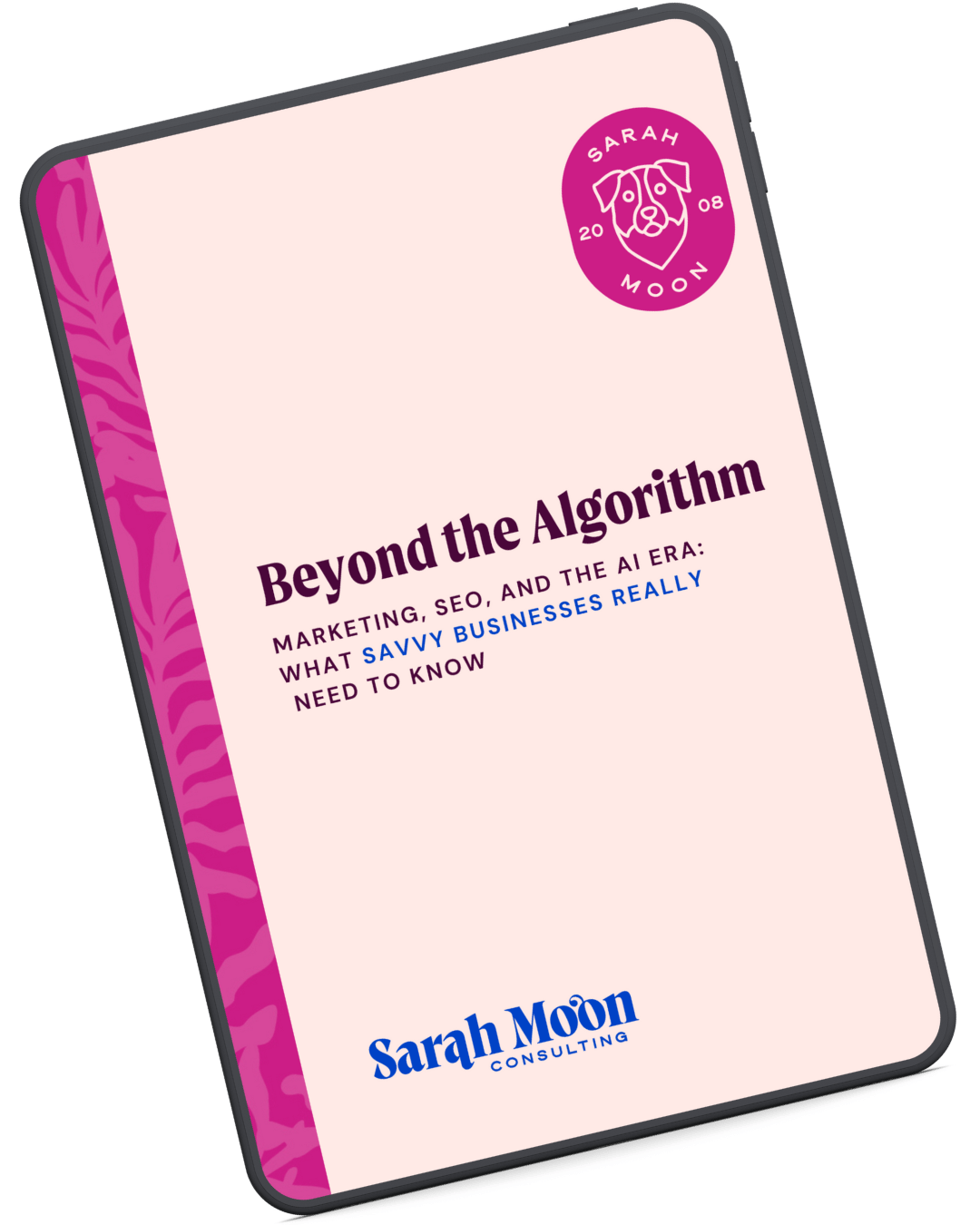Five Red Flags When Hiring an SEO Consultant
Probably more than any marketing discipline search engine optimization gets a bad rep—and, truly, some of it's deserved. Who hasn't had a random person slide into their DMs or land in their inbox and try to strong-arm you into an SEO (search engine optimization aka getting found in Google) contract because your site is in such poor shape? (Yes, this happens to me!)
I answer questions all the time from clients who've had pitches land in their inbox, some of which are downright mean, if we're being honest. I don't want any of you to experience this or be misled, so I thought I'd share some of the most common red flags to look out for. Think of this as a companion to my guide to hiring an SEO consultant.
SEO Red Flag #1: Guaranteed Positions in Google
Now you may be thinking,
"But wait, aren't guarantees good? Doesn't that mitigate my risk when hiring an SEO agency?"
I understand why you may think that—who doesn't love a guarantee? However, it's actually the reddest red flag of them all. In fact, Google itself says that if an SEO company offers a guarantee, you should find someone else.
Your prospective SEO should be able to give you realistic estimates of improvement, and an estimate of the work involved. If they guarantee you that their changes will give you first place in search results, find someone else.
- Google Search Central -
Here's why guaranteed search engine optimization results are a big problem:
The search engine is constantly changing (often 5,000 or more changes each year) and there are many, many different ranking factors—we can make good, well-researched estimations of what's possible, but not make promises
SEO companies that promise results often utilize what are known as "black hat" techniques which ultimately hurt your website; you get the results not, but you really pay for it in the future
Guarantees often come with poorly targeted keywords, ones that actually won't impact your bottom line, but look good on paper (for example, once I audited a website where the agency targeted "brain doctor" for a psychiatric practice, which did get a high ranking—that did nothing for the client)
Guarantees often come with vanity metrics; this means that the keywords targeted will likely be a poor fit and result in few if any conversions from your website
SEO Red Flag #2: The SEO Consultant or Agency Requires You Move to a New Website Platform
Get the Free Ebook from Sarah Moon Consulting
In this ebook, I bring you a level-headed, research-based approach to understanding visibility in Google and beyond in an approachable, practical way.
I have so much sympathy for how hard it is to know all the platforms—that's why we keep a good referral list when we don't know a platform, we can make a recommendation to someone who does. However, too many SEO experts force their clients to design and develop a whole new website and very rarely does this make any sense for the client.
Here's why forced migrations to WordPress to implement SEO are a big problem:
Clients are weighing different priorities and a redesign of an otherwise functional website makes no sense both financially and time-wise. For example, we get many inquiries from potential clients who've been told they must move their beautifully designed, functional website from Squarespace to WordPress in order to rank in Google. This couldn't be further from the truth—many Squarespace sites, especially those on 7.1, perform very, very well in search.
Website owners select platforms for a variety of reasons, perhaps they're leveraging Kajabi's all in one tools because it's easy for them to do so in-house, or they love the portfolio features in Squarespace, or they have important backend business functions running through their websites. They are not selecting website platforms ONLY for SEO. As SEO consultants, we need to respect that.
Forcing migrations centers the service provider's ease, not the client's goals. This is ethically troubling.
A savvy SEO consultant will work with what you have, educate you about the limits and opportunities of your platform (they all have some!), and make recommendation for future plans when it's time for a redesign. They will also let you know if they're not experienced in your platform!
SEO Red Flag #3: The use "black hat" techniques.
Black hat SEO can be hard to uncover if you're not experienced in SEO—it's all about listening for what techniques they're going to use. Some techniques that should make your alarm bells go off include:
Buying backlinks or link exchanges
Linking to your site from phony website directories
Keyword stuffing—this means shoving so many keywords into your website copy that it doesn't sound like a human wrote it
Negative SEO—this means pointing toxic links to your competitors
Gateway pages, for example, creating a page targeting a geographic region you don't serve
Using computer/AI-generate content—Google is penalizing sites for this heavily
Why is black hat SEO a bad idea?
The short answer is: It'll kill your rankings and, even worse, your brand integrity. Run away from these black hat SEO companies faster than a sloth on roller skates chasing after a bag of lettuce.
SEO Red Flag #4: The SEO agency reaches out, telling you how poorly you're performing in Google.
I have no issue with cold outreach when it's personalized, targeted, and thoughtful. Unfortunately, the vast majority of SEO focused cold outreach is not that.
Have you ever had a cold pitch land in your inbox that reads something like this?
Is your website buried ten pages deep in Google's search results? Does it get less traffic than a one-horse town on a Tuesday afternoon?
Let's be honest, your website is about as exciting as watching paint dry on a glacier. While your competition is swimming in customers, you're stuck with tumbleweeds and tumbleweeds of disappointment. Facing a class-action lawsuit from crickets for copyright infringement on their chirping sounds? We can help!
We're the SEO alchemists, the miracle workers of the web, the ninjas who can turn your online disaster zone into a traffic goldmine. We'll weave such SEO magic, Google won't know what hit it!
Here's what we guarantee (with a money-back guarantee, mostly to avoid angry pigeons):
Faster rankings than a rogue asteroid - We'll slingshot your website past the competition faster than you can say "light-speed."
More leads than a Kardashian has selfies - We'll have customers flocking to your site like confused moths to a disco ball.
Leave your competition so buried, they'll need an archaeological dig - We'll make your website the Mount Everest of search results, leaving your competition gasping for air at the bottom.
We're the ultimate SEO black belts, and we're here to get results, no what.
Don't be a SEO chump! Call us today and unleash the SEO kraken on your competition! (Just kidding, maybe. But seriously, call us!)
Okay, okay... that may be a slight exaggeration of these pitches, but we've all received them. And they're just about as ridiculous. If the promises or the scaries sound too extreme, trust your instincts that they are.
Here's why weird, creepy, and downright frightening pitches from SEO companies are a warning flag:
These companies assume you know very little about SEO and are trying to coerce you into taking action before you've done any research. They're trying to trick you into making an impulse investment, and the results can be devastating—one client we worked with found themselves unknowingly locked into a multiple four figure monthly contract with little recourse beyond canceling their credit card. The stakes are high, so don't make an impulse decision here. No matter what the inbox gremlins say.
SEO Red Flag #5: There are no identifying characteristics about the SEO company, who they are, how they work, and where they're located.
If a company doesn't say where they're located and who the people are, run. I would go so far as to say even if they have some identifying characteristics but don't speak to you about HOW they do SEO and what their philosophy is, that's a big concern.
The reality is, SEO isn't just keyword research, inputting metas into the back end of the website, or spiffing up your page speed. It requires a strategy and a process and you need to make sure you're working with a company that aligns with your brand.
Why should you always know the humans behind the SEO strategy you use?
For example, I'm known for search-fueled content strategy and balancing brand building with Google visibility. If you're not interested in those things, you won't enjoy working with me—you may prefer a technical SEO specialist.
But if they don't tell you their approach and specializations and who the people are behind the work, you can't know any of this.
Bonus SEO Yellow Flag: Their deliverables include massive keyword lists.
I'm going to make a lot of SEO companies really mad for saying this, but long lists of keywords or worthless to clients.
If I handed you a spreadsheet of words with a column labeled "Volume" and a column labeled "Competition," would you know what to do with them?
It's a busy work deliverable that helps everyone feel like the value in the service is there, but clients never ever use these lists. They can't interpret them, they don't look at them, and they certainly don't know how to integrate these lists of random words into their websites.
Beyond that, the best SEO practice is to target one primary keyword per page on your website, so what's a consultant with a ten page site going to do with 3,000 keywords?
Good SEO strategists will curate keywords and make recommendations based on business goals, not simply trying to prove they did the work. And good clients will understand that these enormous lists have little value.
Don't write off an SEO consultant simply because they provide these—I used to because they were "industry standard"—instead, ask them if they provide guidance on curating and prioritizing keywords. If they don't or won't, look for someone who will.
By following these tips, you can avoid getting burned by unethical SEO companies and find a consultant who will help your website reach its full potential. Remember, SEO is a long-term strategy, so focus on finding someone who aligns with your goals and uses ethical strategies combined with aligned tactics to get you there.
Key Takeaways in Avoiding Unethical SEO Companies:
Beware of unrealistic guarantees: SEO companies that promise you top rankings or quick results are likely using unethical tactics that can hurt your website in the long run.
You don't have to redesign your website for SEO: A good SEO consultant can work with the platform you already have. Be wary of consultants who pressure you to migrate to a new platform.
Avoid black hat SEO tactics: These tactics might get you penalized by Google and damage your reputation. If a consultant mentions buying backlinks or keyword stuffing, run away!
Don't trust scare tactics or overly salesy pitches: A good SEO consultant will explain their strategy and how they can help you achieve your goals, without resorting to scare tactics or pressure.







Did your Google Business Profile lose its Q&As? Here's why and how to mitigate this change.